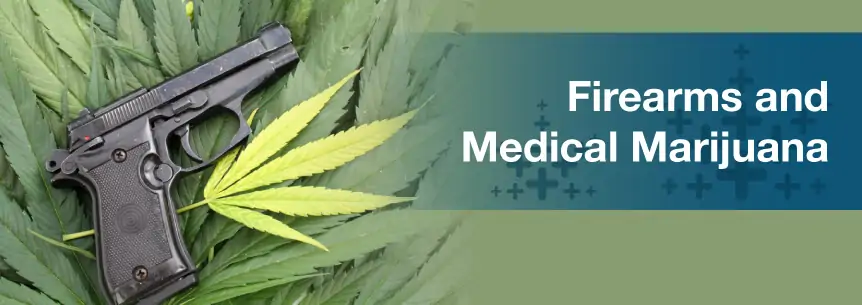
In the United States, the state and federal governments continue to clash on recreational and medical marijuana. A growing area of dispute, which many patients are unaware of when registering with their state government as a medical cannabis patient, is the inability of marijuana consumers to purchase and own firearms. While some states take measures to protect a patient’s right to carry, others side with federal laws, asking patients to turn over their firearms.
Learn more about the legal dilemma regarding firearms and medical marijuana below.
For decades, state and federal legislation have clashed over recreational and medical cannabis, which is why it’s illegal — per federal laws — to purchase or carry a firearm if you are a registered medical marijuana patient. As a patient or caregiver, it’s critical to educate yourself about the legislation impacting your rights as a consumer, as you want to secure your safety.
To start, review the following documents, which discuss medical marijuana and firearm possession.
A familiar law to many patients and consumers is the Controlled Substances Act, which passed in 1970 during the Nixon Administration. Per the Controlled Substances Act, marijuana became classified as a Schedule I drug, which consists of substances defined as offering zero medical use and risking abuse. As research in the decades since demonstrates, that’s not the case with cannabis.
This classification, however, is behind the clash between state and federal laws. It’s why patients cannot receive medical cannabis prescriptions, instead requiring recommendations. It’s why researchers must undergo a time- and resource-intensive application process to obtain medical weed for research. It’s why dispensaries cannot accept credit or debit payments, as banks adhere to federal laws.
Following the assassination of John F. Kennedy, legislators developed the Gun Control Act of 1968. The idea was to regulate the sale of firearms by requiring licensing among manufacturers, dealers and importers. Later, in 1993, lawmakers added to the Gun Control Act of 1968 with the Brady Handgun Violence Prevention Act, also known as the Brady Act.
The passage of the Brady Act introduced the legislation that now prevents medical marijuana patients from purchasing firearms. It references the Controlled Substances Act, stating, “It shall be unlawful for any person to sell or otherwise dispose of any firearm or ammunition to any person knowing or having reasonable cause to believe that such person is an unlawful user of, or addicted to, any controlled substance, as defined in…the Controlled Substances Act.”
In response to the Controlled Substances Act and Gun Control Act, the Bureau of Alcohol, Tobacco, Firearms and Explosives (ATF) made revisions to the Firearms Transaction Record, also referred to as Form 4473. A ruling by the Ninth Circuit Court supporting the federal ban on firearm purchases by registered medical marijuana patients also led to this revision.
In the new form, which vets applicants interested in purchasing a firearm, the ATF added a warning to the question, “Are you an unlawful user of, or addicted to, marijuana…or any other controlled substance?” The additional note states, “The use or possession of marijuana remains unlawful under federal law regardless of whether it has been legalized or decriminalized for medicinal or recreational purposes in the state where you reside.”
As a result of this legislation, as well as documentation, the federal government has made it clear that it does not support or allow medical marijuana and firearms to mix.
More than 25 states have legalized medical cannabis, responding in different ways to the federal laws that affect medical marijuana and concealed carry applications. Examples of responses by state governments include the following:
For many patients, it’s a surprise to learn that they cannot own both medical marijuana and firearms. It’s not until later, such as when applying for a permit, that they find out about the measures taken by the federal government to prevent patients from obtaining a firearm. That’s why it has become a necessity for not only patients to educate themselves but also physicians recommending medical cannabis.
The clash between state and federal laws also emphasizes the growing need for the federal government to adapt its legislation. Today, more than 60 percent of Americans are in favor of legalizing recreational and medicinal weed, which is an increase from past years. Whether the federal government will modify its approach depends on several factors, from the preferences of the current administration to the majority party.
At MarijuanaDoctors.com, we provide patients, physicians and caregivers a trusted resource for learning more about medical cannabis. Whether you’re interested in learning about how to use medical weed, how to qualify for medical marijuana or where to find a licensed medical cannabis physician, you’ll see that we offer all the resources you need to start treating your symptoms with a natural, proven method.
Browse our blog, as well as our resource library, to learn more about the evolving standard between medical marijuana and firearms.
No Information on MarijuanaDoctors.Com should be used to diagnose, treat, prevent or cure any disease or condition. You can view our Full Disclaimer here.